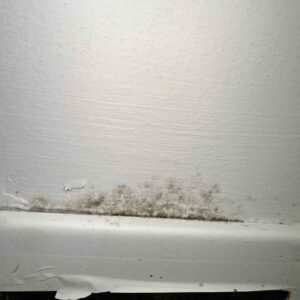Homebuyers will often perform many checks prior to purchasing a home. They will schedule home inspections, termite inspections, and appraisals. However, many Florida homeowners fail to schedule mold testing prior to purchasing a home. Don’t underestimate the role of mold testing in real estate transactions. Nearly half of all homes in the United States contain mold. This number is likely slightly higher in Florida. Before you finalize your purchase, you want to ensure that unseen mold isn’t causing health risks or potential property damage.
Understanding Mold Testing in Real Estate Transactions
Mold, like mushrooms, is a type of fungus. It reproduces my fruiting spores which easily spread in the surrounding environment. Like most plants, mold also produces defense mechanisms. The defenses (mycotoxins) can cause negative health reactions in humans and animals. Mold requires 3 sources to grow:
- Water
- Organic matter (food)
- Adequate temperature
When these 3 ingredients are present, ANY home is susceptible to mold growth. Especially in places like Florida which experience high humidity, warm temperatures, and frequent rain. There are thousands of different species of mold but the most common ones found in homes include:
- Cladosporium
- Penicillium
- Aspergillus
- Alternaria
- Stachybotrys chartarum
Mold is most commonly found in wet locations in homes. Namely, kitchens and bathrooms. However, it can often occur in any part of the home where there was a past roof or window leak, or a slow-leaking pipe or slab leak. Mold inside of walls is more difficult to detect and requires an inspection by a professional mold assessor. This is why mold testing in real estate transactions is crucial.

Prolonged mold exposure poses significant health risks ranging from respiratory issues to neurological conditions. It’s especially hazardous for more vulnerable individuals like pregnant or nursing mothers, young children, individuals with chronic disease like autoimmune disorders, and the elderly.
The Importance of Mold Testing in Real Estate Transactions
Again, mold testing in real estate transactions is just as important as home and termite inspections to ensure the home you’re buying is a good investment. The last thing you want to happen is to purchase a home and then 3 months later develop unexplainable health issues and uncover mold. This can cost you thousands of dollars and puts you and your family’s health at risk.

Here are some items that professional mold assessors will provide/check for during their assessment:
- Mold testing and analysis
- Indoor air quality assessment
- Ventilation and HVAC system functionality
- Mold clearance certificate
Assessors utilize specialized equipment and skills to find potentially hidden mold issues. They can also look at the overall structure of the home to determine the efficacy of ventilation, potential moisture source areas, and what types of mold (and in what quantities) are present in your home.
If mold is discovered, buyers then have the option to back out of the offer or force the sellers to address the issues before purchasing.
Addressing Mold Issues: Next Steps for Homebuyers
Again, if issues come up during the mold assessment, homebuyers have more options on the table for how to move forward. When mold assessors conduct mold testing, they send the air quality sample to a certified laboratory. The lab determines the concentration of mold and the types of mold present in the home’s indoor air. Depending on the results, if the home requires mold remediation, the assessor will create a protocol for how to address the issue.
The mold protocol can then be given to a professional mold remediation company, which will then provide an estimate based on the scope of work. This cost can range anywhere from $3,500 – $100,000 depending on the scope of the work. Buyers and sellers can then negotiate the real estate transaction accordingly. Namely, the buyers can ask the sellers to cover the cost of the remediation or deduct the cost of the remediation from the sale price of the home.
Part of addressing the mold issues is also ensuring that it won’t come back in the future. This could mean upgrading the home’s ventilation or HVAC system or replacing areas like the roof or windows. The extent depends on the cause of the mold.
Mold Testing in Real Estate Transactions in Florida
Flo-Air, LLC is your go-to company for mold testing in real estate transactions in Florida and South Georgia. We’re based in Jacksonville, FL, and serve communities throughout the state.
Our mold assessors are experienced and equipped with state-of-the-art equipment.
